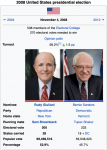2001 - 2005: George W. Bush / Dick Cheney (Republican)
2000: Al Gore / Joe Lieberman (Democrat)
2005 - 2013: Dick Gephardt / Gary Locke (Democrat)
2008: George W. Bush / Dick Cheney (Republican)
2012: George W. Bush / Mitt Romney (Republican)
2013 - 2021: Norm Coleman / Michael Steele (Republican)
2012: Gary Locke / Hillary Clinton (Democrat), Jesse Ventura / Michael Flynn (Independent)
2016: Nina Turner / Daniel Hynes (Democrat), Michael Flynn / Cindy Sheehan (Movement for America)
2021 - 2021: Andrew Romanoff / Clay Aiken (Democrat)
2020: Christopher M. Vance / Robert Zoellick [replacing Erick Erickson] (Republican), Michael Flynn / Charlotte Pritt (Movement for America)
2021 - 2025: Clay Aiken / Richard Hanna (National Union)
There are few politicians who’s public image plummeted as quickly as former President Dick Gephardt’s. Though remembered largely as a mediocre president, most notably due to his flip-flopping on Iraq, and the 2009 recession, though he gained major plaudits among the left for increasing Medicare and Medicaid to millions of Americans during his presidency. Following the end of his second term, and the death of Bill Clinton, Gephardt increasingly started to function as an elder statesman who would routinely fly to Moscow, as relations between Putin and Coleman increasingly worsened, and Ankara, who under a new nationalist secular junta moved away from the Western bloc, until the restoration of democracy in 2016.
Gephardt’s ties with the Russian president especially came under increasing scrutiny in the 2010s. The good relations enjoyed in the nineties were a distant memory, and both Republican and Democratic commentators were speaking of a new cold war between America and Putin’s Russia. The hawkish sentiment present in the early 2000s had never really left, though it was not as intense. Nevertheless, the absence of a credible anti-war candidate led to Ventura’s independent candidacy in 2012. Despite his failure to enter the debates, due to establishment ratfucking, or win a single state, his candidacy inspired a new movement, spearheaded by supposedly disgraced former lieutenant general Michael Flynn.
Flynn took the movement into a more pro-Russian and pro-Gaddafi direction, while at the same time increasingly filling it with right-wing populists, while at the same time the number of leftists dwindled, many opting to support progressive Ohio Governor Turner’s failed 2016 campaign instead. Following his enthusiastic endorsement of his VP Gary Locke, his far less eager support of Turner was not surprising, especially when his endorsement for Senator Hillary Clinton in the 2012 primary is taken into consideration.
However, it was the 2020 election that saw the former President’s reputation quickly diminish. Colorado Governor Romanoff’s surprise victory in the primaries was compared to Gephardt’s in 2004. A popular politician from a swing-state running in an environment that was increasingly beneficial to the Democrats. Another reason for the comparison was the fact that Romanoff was the frist non-ethnic minority Democratic candidate since the former President. Yet, Gephardt opted to endorse the Flynn/Pritt ticket instead.
This announcement sent shockwaves through the political arena, as his support for the increasingly fascistic wannabe strongman was seen as treason by many Democrats, with his former number two Locke even calling him out during his speech at the DNC. The Republicans, despite their numerous attempts, failed to capitalize on this as they would quickly have to deal with a scandal of their own with VP-candidate Erickson repeatedly shouting the n-word on a Sascha Baron Cohen live prank show. His replacement with former Coleman SoS Zoellick was received very poorly by both the Republican base, and those who supported Washington Governor Vance exactly because he offered something new.
All of this led to Flynn gaining nearly 25% of the votes, and becoming the first third-party candidate to win a state since George Wallace in 1968, as he won both West Virginia and Alabama, the latter by less than a thousand votes. Nevertheless, Romanoff managed to get a surprisingly comfortable victory, subsequently attributed to vote-splitting on the right, despite Flynn’s protests that he represented the centre, and the true conscious of Middle America.
Despite Romanoff’s promise that he would mainly focus on domestic issues, after the rowdy Coleman years, only two months into his presidency he was forced back into foreign politics, as Russian President Putin invaded the newly democratized Belarussian Republic, and deposed President Viktar Babaryka. NATO sanctions were unable to halt the joint Russo-Ukrainian invasion, though it did cause a civil war in the latter, in which the US and it’s European allies aided the pro-Western Lviv government with billions of dollars worth of aid and weaponry.
Gephardt’s mild support for the Russian led war, was received with little surprise, yet a lot of condemnations. Attempts to remove him from the Democratic party failed, but Gephardt became a pariah outside of Movement for America circles, who’s congressional delegation split between anti-Russia congresswoman Kshama Sawant, and pro-Russia senator Roy Moore. Most of what was left of the left-wing faction left the party and formed the United Front instead, though Gephardt, despite not being a member of either party, continued to speak positively of Flynn and Putin.
Another controversial foreign leader that he had something positive to say for was Libyan dictator Muammar Gaddafi. The increasingly eccentric strongman had severed ties with the US in the mid-2010s following generally cordial relations throughout Bush and Gephardt’s presidencies. At home the dictator faced little-to-no opposition, as minor protests were quickly put down in 2011, though this changed exactly ten years later, as growing grain prices, due to the Ukrainian civil war, led to rioting across much of the Maghreb. Only Tunisia saw more protests than Libya, as the country increasingly teetered into civil war. Gaddafi saw the situation in the neighboring country as an opportunity, and opted to ‘liberate’ the Tunisian people.
The American resposnse was swift, and only a few weeks later NATO boots landed on Tunisia, and drove the Libyans out, Romanoff and Berlusconiwanted to go one step further, and made their troops cross the Libyan border hoping to finally get rid of the madman Gaddafi. While this mission seemed to go largely successful, despite the UK and France opting out, it led to massive protests across much of the US. Mostly by Flynn supporters. For a time it seemed as if this wouldn’t lead to anything substantial, but on the 27th of September pro-Flynn elements in the United States Armed Forces waged a failed coup attempt against the Democratic government, and killed President Romanoff.
Now, a nation in a state of semi-civil war is led by former American Idol winner Clay Aiken. Fighting enemies both at home and abroad, America’s first LGBT+ President is finding it increasingly hard to retain some kind of order across the 50 states.



